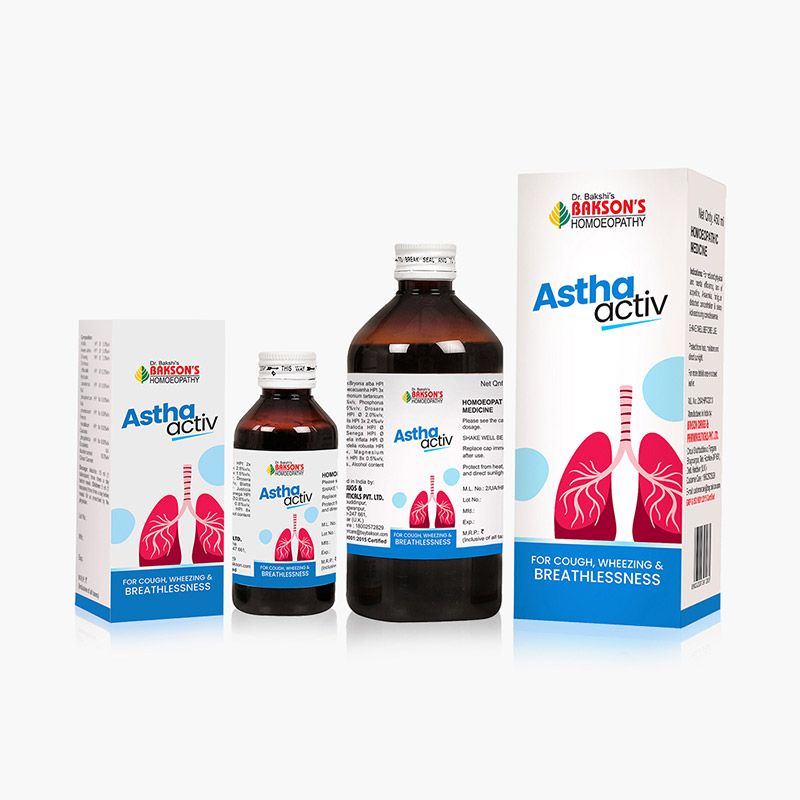We use cookies to make your experience better. To comply with the new e-Privacy directive, we need to ask for your consent to set the cookies. Learn more.
ASTHA ACTIV SYRUP
Eases Breath
Bronchial asthma is a reversible obstruction of the airways. An asthma attack may begin acutely with bouts of wheezing, coughing, and shortness of breath or with slowly increasing symptoms and signs of distress in the respiratory system. In this case, the person usually first notices the onset of breathing difficulty that becomes more rapid, with coughing and tightness or pressure in the chest, and there may even be audible wheezes. Persistent bronchitis may lead to asthma. The factors that trigger the airways are pollution, allergy, bacterial and viral infection, etc.
Astha Activ is an effective homoeopathic formulation to relieve symptoms of difficult breathing.
Composition: Bryonia alba 2x, Ipecacuanha 3x, Antimonium tartaricum 8x, Phosphorus 8x, Drosera rotundifolia Ø, Blatta orientalis 3x, Justicia adhatoda Ø, Senega Ø, Lobelia inflata Ø, Grindelia robusta Ø, Magnesium phosphoricum 8x.
Indications: For wheezing, bronchitis, and recurring attacks of cold and cough.
Dosage: Adults: 5 ml (1 teaspoon) every 3 hours. Children: 2.5 ml (1/2 teaspoon) every 3 hours or as prescribed by the physician.
For best results take Astha activ with water.
Contra-indication: None
Side effects: No known side effects
Expiry: 5 years from the date of manufacturing.
Manufactured in India by: Bakson Drugs and Pharmaceuticals Pvt. Ltd. Chouli Shahbuddinpur, Pargana Bhagwanpur, The. Roorkee-247661, Distt Haridwar, UK, India Customer care executive Mail id and contact details-customercare@buybakson.com, 18002572829
Disclaimer: The information provided herein on request, is not to be taken as a replacement for medical advice or diagnosis or treatment of any medical condition. DO NOT SELF MEDICATE. PLEASE CONSULT YOUR PHYSICIAN FOR PROPER DIAGNOSIS AND PRESCRIPTION.
Our respiratory tract is composed of the upper (nose, pharynx, and larynx) and lower respiratory tract (trachea, bronchi, bronchioles, alveolar duct, and alveoli). They all are branched together in a chain-like manner which is susceptible to inflammation and infection. Diseases affecting the respiratory tract are common in damp, cold, and drastically varying climates. Bronchial asthma is a reversible obstruction of the airways. Changes in the immune system and the control of the diameter of the airways are probably responsible for attacks of wheezing. Asthmatic attacks are characterized by the narrowing of the large and small airways due to spasms of the muscles of the bronchial tubes, edema, inflammation in the inner lining of the airways, and production of the mucus. Asthma can occur at any age and individuals with asthma differ greatly in the frequency and degree of their symptoms. Some have only occasional attacks that are mild in degree and of brief duration and otherwise are entirely free of symptoms. Others have mild coughing and wheezing most of the time. An asthma attack may begin acutely with bouts of wheezing, coughing, and shortness of breath or with slowly increasing symptoms and signs of distress in the respiratory system. In this case, the person usually first notices the onset of breathing that is difficult and becomes more rapid, coughing and tightness or pressure in the chest, and may even notice audible wheezes. Asthma may often go unnoticed though there is little difficulty in identifying a child with a history of other allergic disorders, who suffers from recurrent wheezing. Yet many children with persistent coughs, particularly at night, and wheezing episodes are regarded as suffering from bronchitis triggered by infection of the airways. Persistent bronchitis may lead to asthma. The factors that trigger the airways are pollution, allergy, bacterial and viral infection, etc. Action of Ingredients: Bryonia alba: It helps relieve symptoms of the respiratory tract such as asthma, and dry cough. Ipecacuanha: It is indicated to provide relief when asthma is associated with nausea, violent or wheezing cough. The chest seems full of phlegm but does not come out on coughing. Very useful for children. Antimonium tartaricum: It is helpful for patients who wake up in the middle of the night due to great difficulty in breathing. It is also helpful when patients sense that they cannot inhale enough air to breathe and experience an excessive, rattling cough. Phosphorus: It helps in relieving congestion in the chest and treats related issues such as excessive cough, asthma, and bronchitis. Drosera rotundifolia: Relieves congestion of the chest and lungs and treats spasmodic cough. Provides relief from irritation of the throat causing breathing difficulties. Blatta orientalis: For cough with much pus-like mucus. Reduces breathing difficulties and helps treat severe cough and lung infection. Justicia adhatoda: For bronchial catarrh with running nose, sneezing, dry cough from chest region with suffocative obstruction of respiration, tightness across the chest, and whooping cough. Senega: It is used for inflammation of the throat, nose, and chest.; for lung conditions including asthma, chronic bronchitis, and emphysema. Lobelia inflata: For the sensation of a lump in the chest. It can also be helpful for an asthma attack. Magnesium phosphoricum: It is indicated for spasmodic and whooping cough. |




